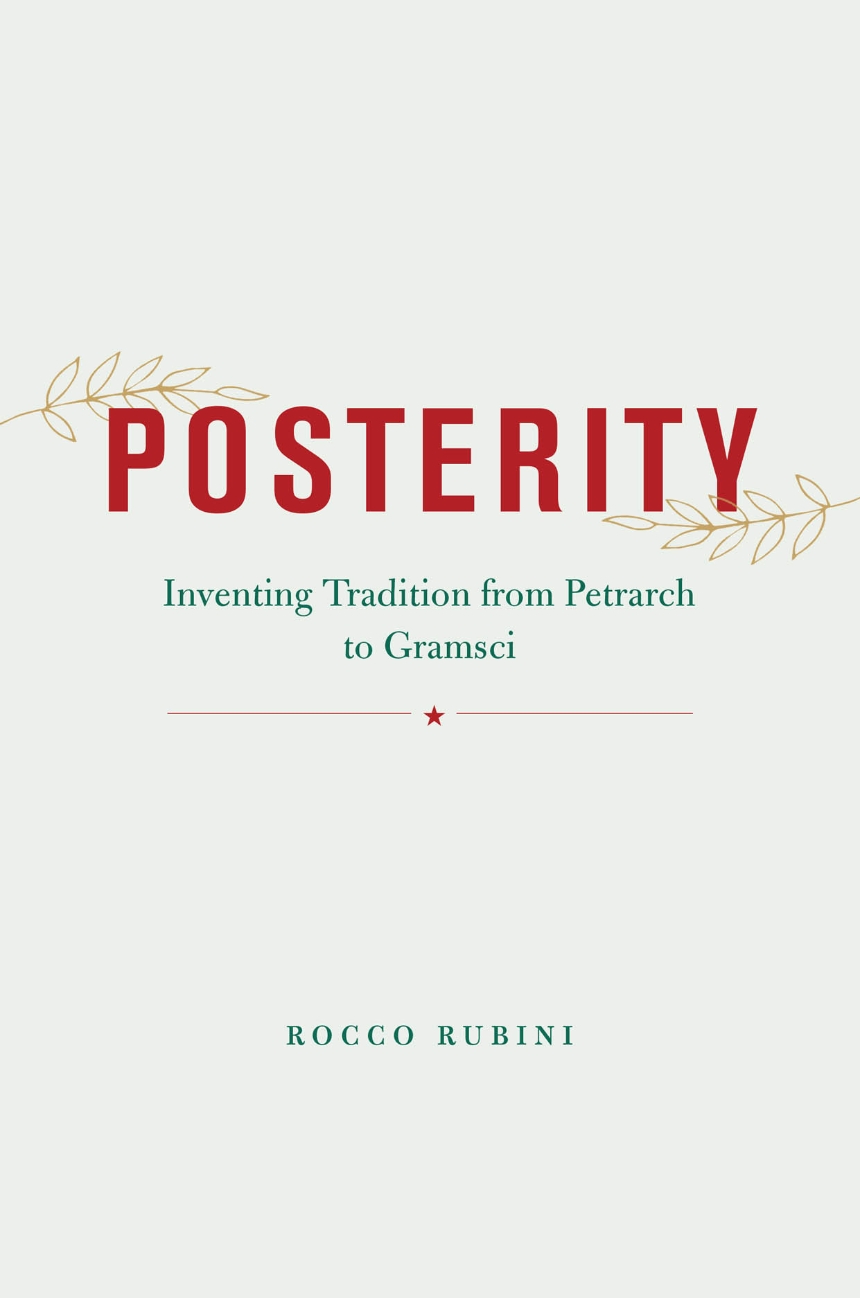Posterity
Inventing Tradition from Petrarch to Gramsci
Reading a range of Italian works, Rubini considers the active transmittal of traditions through generations of writers and thinkers.
Rocco Rubini studies the motives and literary forms in the making of a “tradition,” not understood narrowly, as the conservative, stubborn preservation of received conventions, values, and institutions, but instead as the deliberate effort on the part of writers to transmit a reformulated past across generations. Leveraging Italian thinkers from Petrarch to Gramsci, with stops at prominent humanists in between—including Giambattista Vico, Carlo Goldoni, Francesco De Sanctis, and Benedetto Croce—Rubini gives us an innovative lens through which to view an Italian intellectual tradition that is at once premodern and modern, a legacy that does not depend on a date or a single masterpiece, but instead requires the reader to parse an expanse of writings to uncover deeper transhistorical continuities that span six hundred years. Whether reading work from the fourteenth century, or from the 1930s, Rubini elucidates the interplay of creation and the reception underlying the enactment of tradition, the practice of retrieving and conserving, and the revivification of shared themes and intentions that connect thinkers across time. Building on his award-winning book, The Other Renaissance, this will prove a valuable contribution for intellectual historians, literary scholars, and those invested in the continuing humanist legacy.
Rocco Rubini studies the motives and literary forms in the making of a “tradition,” not understood narrowly, as the conservative, stubborn preservation of received conventions, values, and institutions, but instead as the deliberate effort on the part of writers to transmit a reformulated past across generations. Leveraging Italian thinkers from Petrarch to Gramsci, with stops at prominent humanists in between—including Giambattista Vico, Carlo Goldoni, Francesco De Sanctis, and Benedetto Croce—Rubini gives us an innovative lens through which to view an Italian intellectual tradition that is at once premodern and modern, a legacy that does not depend on a date or a single masterpiece, but instead requires the reader to parse an expanse of writings to uncover deeper transhistorical continuities that span six hundred years. Whether reading work from the fourteenth century, or from the 1930s, Rubini elucidates the interplay of creation and the reception underlying the enactment of tradition, the practice of retrieving and conserving, and the revivification of shared themes and intentions that connect thinkers across time. Building on his award-winning book, The Other Renaissance, this will prove a valuable contribution for intellectual historians, literary scholars, and those invested in the continuing humanist legacy.
360 pages | 6 x 9 | © 2021
History: History of Ideas
Literature and Literary Criticism: Romance Languages
Philosophy: General Philosophy
Reviews
Table of Contents
Acknowledgments
List of Abbreviations
Introduction: Whole or Nothing
The Method: Hermeneutics between Gadamer and Betti
The Story: Humanism between Petrarch and Gramsci
One Primi and Ultimi: Petrarch’s Corpus
Introduction: Total Petrarch, Different Petrarch?
“I was not born to be a slave of my body”: (Re-)writing the Past
Reading the Future
Including the Excluded: Petrarch’s Familiar Invectives
Conclusion
Two The Purpose of Literary Criticism: Francesco De Sanctis’s (Anti-)Petrarchism
Introduction: Italian Petrarch, (Un-)congenial Petrarch
A Rhetorical Existence
“Going to the people”: Literary Criticism as Moral Philosophy
The Anti-Petrarch
Conclusion: Petrarch as Pharmakon
Three “Do not grow weary of reading, for I do not grow weary of writing”: Goldoni’s Reform of Italian Literature
Introduction
Enough Is Enough: The Italian Comic Complex
Reforming . . . from Without
“With the mask I’m Brighella, without the mask I’m a man”: Reforming . . . from Within
Conclusion: If Not Molière, Then What?
Four The Vichian Resurrection of Commedia dell’Arte: Reciprocating Modernity between Italy and France
Introduction
Vico’s Laughter
Giving and Receiving Modernity: A Shared Vichism
“À quoi bon le théâtre italien?”
Conclusion
Five Remembering Is Not Thinking: Croce, Gramsci, and Italian Intellectual Autobiography
Introduction
Beyond Laughter: For a “Reform” of Italian Thought
“A tall and blond Marx”: Antonio Labriola and Benedetto Croce
Rehearsing the Anti-Croce
The (Auto-)biography of a Nation
Conclusion
Conclusion: The Last Renaissance Man
Index
List of Abbreviations
Introduction: Whole or Nothing
The Method: Hermeneutics between Gadamer and Betti
The Story: Humanism between Petrarch and Gramsci
One Primi and Ultimi: Petrarch’s Corpus
Introduction: Total Petrarch, Different Petrarch?
“I was not born to be a slave of my body”: (Re-)writing the Past
Reading the Future
Including the Excluded: Petrarch’s Familiar Invectives
Conclusion
Two The Purpose of Literary Criticism: Francesco De Sanctis’s (Anti-)Petrarchism
Introduction: Italian Petrarch, (Un-)congenial Petrarch
A Rhetorical Existence
“Going to the people”: Literary Criticism as Moral Philosophy
The Anti-Petrarch
Conclusion: Petrarch as Pharmakon
Three “Do not grow weary of reading, for I do not grow weary of writing”: Goldoni’s Reform of Italian Literature
Introduction
Enough Is Enough: The Italian Comic Complex
Reforming . . . from Without
“With the mask I’m Brighella, without the mask I’m a man”: Reforming . . . from Within
Conclusion: If Not Molière, Then What?
Four The Vichian Resurrection of Commedia dell’Arte: Reciprocating Modernity between Italy and France
Introduction
Vico’s Laughter
Giving and Receiving Modernity: A Shared Vichism
“À quoi bon le théâtre italien?”
Conclusion
Five Remembering Is Not Thinking: Croce, Gramsci, and Italian Intellectual Autobiography
Introduction
Beyond Laughter: For a “Reform” of Italian Thought
“A tall and blond Marx”: Antonio Labriola and Benedetto Croce
Rehearsing the Anti-Croce
The (Auto-)biography of a Nation
Conclusion
Conclusion: The Last Renaissance Man
Index
